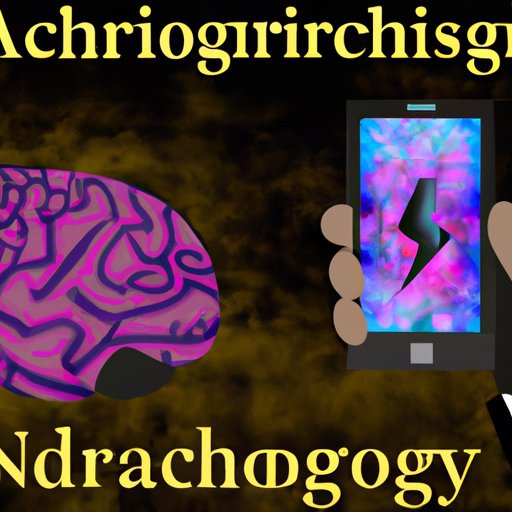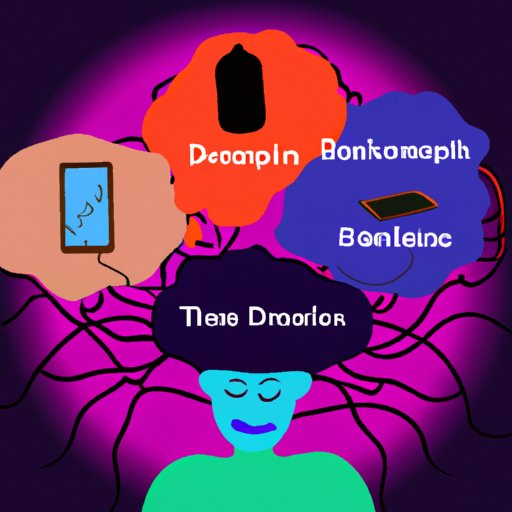Introduction
Technology addiction is a term used to describe an unhealthy obsession with the use of digital devices, such as smartphones, computers, and tablets. It can lead to a range of physical and psychological symptoms, including anxiety, depression, insomnia, and poor decision-making. In this article, we will explore how technology addiction can affect the brain, covering topics such as neurochemistry, cognitive functioning, mental health, sleep quality, stress levels, brain development, and social interactions.

Analyzing the Neurochemistry of Technology Addiction
When we use technology, our brains release a surge of neurotransmitters, such as dopamine and serotonin. Dopamine is a “reward” chemical that is released in response to pleasurable activities. It not only reinforces these behaviors but also creates a craving for them. In other words, it encourages us to seek out more of the same experiences. This is why technology addiction is so hard to break; the reward system in our brains is constantly being triggered by the use of technology.
However, it is not just the dopamine that is responsible for reinforcing technology addiction. Research has found that the production of other neurotransmitters, such as norepinephrine and glutamate, is also altered in people who are addicted to technology. Norepinephrine is involved in regulating arousal and alertness, while glutamate plays a role in learning and memory. Both of these neurotransmitters have been linked to addictive behavior, suggesting that technology addiction can have a profound effect on our neurochemistry.

Examining the Effects of Technology Addiction on Cognitive Function
Research has shown that technology addiction can impair decision-making and problem-solving abilities. According to a study published in the journal Frontiers in Psychology, people who spend excessive amounts of time using technology are more likely to make impulsive decisions without considering the consequences. The researchers suggest that this could be due to the fact that technology addiction alters the way our brains process information, leading to poorer decision-making skills.
In addition, technology addiction has been linked to memory problems. Research has found that people who are addicted to technology have difficulty recalling information, which can lead to poor academic performance in school. Furthermore, technology addiction has been associated with an increased risk of developing Alzheimer’s disease and other forms of dementia later in life.
Exploring the Impact of Technology Addiction on Mental Health
Technology addiction has been linked to a range of mental health issues, including depression and anxiety. According to a study published in the journal Cyberpsychology, Behavior, and Social Networking, people who are addicted to technology are more likely to experience feelings of loneliness, isolation, and depression. Furthermore, research has found that people who are addicted to technology are more likely to develop suicidal ideation.

Investigating the Relationship Between Technology Addiction and Sleep Quality
Technology addiction has also been linked to sleep disturbances. According to a study published in the journal Sleep Medicine Reviews, people who excessively use technology are more likely to experience difficulty falling asleep and staying asleep. Furthermore, research has found that the blue light emitted from digital devices can disrupt natural sleep patterns, leading to fatigue and daytime sleepiness.
Assessing the Link Between Technology Addiction and Stress Levels
Technology addiction has been linked to higher levels of stress. Research has found that people who are addicted to technology have elevated cortisol levels, which can lead to feelings of anxiety and depression. Furthermore, technology addiction can interfere with our ability to relax and unwind, making it difficult to manage stress in healthy ways.
Examining the Correlation Between Technology Addiction and Brain Development
Technology addiction has been linked to changes in the structure and functioning of the brain. According to a study published in the journal Developmental Cognitive Neuroscience, people who are addicted to technology have reduced grey matter volume in the prefrontal cortex, the area of the brain responsible for executive functioning. This can lead to impaired decision-making and problem-solving abilities, as well as difficulty controlling impulses and emotions.

Evaluating the Impact of Technology Addiction on Social Interactions
Technology addiction has been linked to communication problems. Research has found that people who are addicted to technology have difficulty expressing themselves verbally, leading to poor interpersonal relationships. Furthermore, technology addiction has been associated with an increased risk of social isolation and withdrawal from social activities.
Conclusion
In conclusion, technology addiction can have a significant impact on the brain. It can alter the production of neurotransmitters, leading to impaired decision-making and problem-solving abilities. Furthermore, it can increase the risk of developing depression and anxiety, as well as disrupt natural sleep patterns and increase stress levels. Finally, technology addiction can lead to changes in the structure and functioning of the brain, as well as communication problems and social isolation. To address technology addiction, it is important to seek professional help and create healthy boundaries around technology use.
(Note: Is this article not meeting your expectations? Do you have knowledge or insights to share? Unlock new opportunities and expand your reach by joining our authors team. Click Registration to join us and share your expertise with our readers.)
